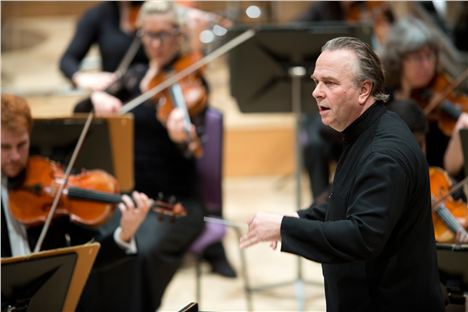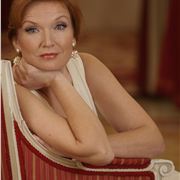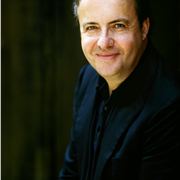MANCHESTER’s three major orchestras are joining forces to celebrate the 150th anniversary of the birth of the great German composer, Richard Strauss.
“He knew how to exploit the radiance, eroticism, drama, tenderness and humour of a voice."
Until March 8 the Hallé, BBC Philharmonic, Manchester Camerata and The Bridgewater Hall (with RNCM involvement at one point) will serve up his orchestral songs and many of his great orchestral works or tone poems in Strauss’s Voice.
It’s not the first time the three have collaborated on a project – symphony cycles based on Shostakovich in 2008 and Mahler (2010) were a huge success. But Strauss’s Voice promises a very different kind of musical journey. In a composing career that started in 1870, when he was only six, to his death in 1949 he wrote more than 200 songs, many barely known today. German-born, a romantic modernist, he has no connection to Austria’s Johann Strauss, known for the Blue Danube and waltzes.
 Sir Mark close up conducting the Hallé orchestra
Sir Mark close up conducting the Hallé orchestra
Opening with Alexander Vinogradov performing two of Strauss’s rare songs for bass, the festival includes cello maestro Steven Isserlis taking the title role in his comic adventure Don Quixote (January 18, the bill also includes Also Sprach Zarathustra, for the Ubermensch in you!), the majestic Alpine Symphony with 125 players from the Hallé and BBC Philharmonic coming together under Juanjo Mena (January 23), Anne Schwanewilms performing his haunting Four Last Songs with the Halle under the baton of Markus Stenz (February 5, 6, 9). These, among his best-loved work, were written in 1948 when he was 84.
 Singer Anne SchwanewilmsThree years previously he had written an equally autumnal masterpiece, Metamorphosen. On February 22 it will be performed by 23 of the Manchester Camerata’s string players in a late night performance after the main concert featuring three Strauss songs; while on February 27 Sir Mark Elder conducts the Halle in a programme featuring the composer’s Orchestral Songs. The festival culminates with the colossal Ein Heldenleben (A Hero’s Life) from the BBC Phil directed by John Storgards (March 8).
Singer Anne SchwanewilmsThree years previously he had written an equally autumnal masterpiece, Metamorphosen. On February 22 it will be performed by 23 of the Manchester Camerata’s string players in a late night performance after the main concert featuring three Strauss songs; while on February 27 Sir Mark Elder conducts the Halle in a programme featuring the composer’s Orchestral Songs. The festival culminates with the colossal Ein Heldenleben (A Hero’s Life) from the BBC Phil directed by John Storgards (March 8). Among the joys of such a comprehensive celebration of one composer’s output are the special workshops and preview talks. Unmissable will be Strauss’s biographer and legendary Manchester journalist and critic Michel Kennedy in conversation with the BBC's Petroc Trelawny at 5.30pm on January 22 in the Bridgewater’s Barbirolli Room. A non-ticketed event, capacity is limited and entrance will be on a first-come-first-served basis.
 Spanish conductor Juanjo MenaIn his online introduction to the festival, Kennedy, its honorary patron writes: “He knew how to exploit the radiance, eroticism, drama, tenderness and humour of a voice – a woman’s voice in particular. Generations of great women singers have been drawn to his music in recitals and on the opera stage. He found his own mature voice in song more quickly than in orchestral works...
Spanish conductor Juanjo MenaIn his online introduction to the festival, Kennedy, its honorary patron writes: “He knew how to exploit the radiance, eroticism, drama, tenderness and humour of a voice – a woman’s voice in particular. Generations of great women singers have been drawn to his music in recitals and on the opera stage. He found his own mature voice in song more quickly than in orchestral works...“Other composers have written marvellous music for the female voice, but Strauss had something extra-special. ‘That’s like Strauss’, one says of another’s song or tone-poem, but it is only superficially alike.There is a subtlety in Strauss’s use of harmony that is his alone – rich, but not lush, as are many of his imitators. There’s often a hint of disillusion when the sweetness curdles.”
Strauss’s Voice, January 9-March 8 2014.
At the Bridgewater Hall, Lower Mosley Street, Manchester, M2 3WS.
Tickets are £10-£38 and can be booked at www.bridgewater-hall.co.uk.
For full details of all concerts and other events visit www.straussvoice.com.













